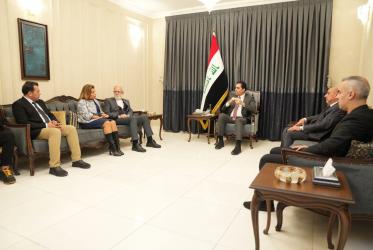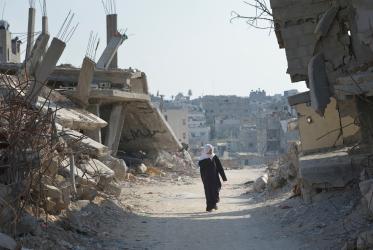21 July 2006
Dear Member Churches in the Middle East, Europe and North America,
Greetings to you as sisters and brothers in Christ and fellow disciples of the Prince of Peace.
In recent days we have all been stirred with compassion and beset with sadness at the shedding of innocent blood in the Middle East. The people of Lebanon are suffering violence whose scale defies comprehension; citizens of Israel fear death from the sky; Palestinians and Iraqis mourn new losses day after day. No end to the suffering is in sight. The earth shakes in Galilee, and nations seem to crumble before our eyes. Ancient cries of anguish echo in our ears: Even when I cry out,"Violence!" I am not answered. I call aloud, but there is no justice. (Job 19:7) At such a time we must turn to God with our laments, seek comfort from each other and offer signs of hope to neighbours in distress.
Many of us feel a mixture of fresh alarm and old frustration that so much is so dangerously wrong in the Middle East. World leaders are troubled, too. They met while bombs and rockets flew, yet returned home without uniting for peace. The world watched with tired hope but saw no bold actions to save lives.
The international community's capacity in such a crisis grows if it finds unity around what needs to be done. Alternatives to the violence in Lebanon, Israel and Gaza are well within its grasp, including cease-fires that end the spiral of violence, pressure to stop attacks on innocent civilians and protection for civilians according to international humanitarian law, support for negotiations on equitable terms and the deployment of a multinational force capable of keeping peace.
However, instead of policies anchored in law, certain states seem bent on applying new and dangerous remedies to well-known problems in the region. Their leaders excuse uses of force that go well beyond the constraints of international law. They brand enemies as terrorists', bypass laws, courts, and juries, and mete out punishment at will even including assassinations from the air. Militant groups adopt similar tactics, fuelling conflicts and spreading contempt for human lives. In Lebanon, Gaza, the West Bank and Israel as well as Iraq, no amount of fear and anger can justify retaliatory targeting of homes, bombing of communities and destruction of a nation's infrastructure. There, as in Afghanistan, deaths, injuries and damages inflicted through retaliation have far, far outnumbered the casualties and damage caused by the initial attacks. Acts of terror do not give license to wreak terror in return.
"Acts of terror are criminal acts and should be addressed by the use of instruments of the rule of law," the WCC Assembly said in February of this year. "Measures to counter terrorism must be demilitarized and the concept of the war on terror' must be firmly challenged by the churches." The militarization of the war on terror' has put civilians at greatest risk. State and public security is not found in violence but in justice, in governance and development that serves marginalized groups, and in respect for human rights and the dignity that God has given all people.
As churches we are inheritors of resolute hope. Our tradition is to support those who suffer, to assist those in need, and to advocate for those denied justice. Let us then raise our laments to God and bring the requirements of peace to those who have ears to hear:
First, let us join in lamenting the loss of life and destruction of homes and livelihoods; praying for healing of those who suffer and for justice to constrain those who would destroy; and praying for the safety and well-being of all communities in the Middle EastMuslim, Christian, and Jewish.
Second, let us help. 500,000 people have already been uprooted by the attacks on Lebanon, the UN reports. Gaza lives under collective punishment, incursions and siege. Dwellings and workplaces in Israel have been destroyed. Churches and related agencies are serving some of these needs. They need our support, and Action by Churches Together is co-ordinating appeals for aid (for contact information, please see below*).
Third, we must speak out. Churches of the Middle East consistently ask sister churches around the world to speak out on their behalf to parishes, the public, their governments and to the embassies of governments most directly involved in the Middle Eastthe United States, Israel, the European Union and Russia. We commend such action to you and ask the churches to use policies that you have set through the WCC and similar policy-making bodies. Calls to bring to public attention include:
- immediate cease-fires; protection of civilians as prescribed by law including the Geneva Conventions;
- release of all those in detention, or trial under due process of law and according to international norms;
- multilateral implementation of long-delayed UN Security Council resolutions for peace in Lebanon, Israel and the Occupied Palestinian Territories, including an urgent end to the illegal 39-year occupation that is the vortex of the region's violent storms.
The World Council of Churches has always held that justice among the states and peoples of the Middle East must be based on the international rule of law and on rigorous implementation of United Nations Security Council resolutions pertaining to the conflicts. May we continue to stand together, praying for peace with justice to embrace all concerned. As we pray, so may we believe. And so, too, be moved to action.
Yours in Christ,
Rev. Dr. Samuel Kobia
General Secretary
Attachments:
- WCC Executive Committee Statement on the Conflict in Israel/Palestine: The Time is Ripe to Do What is Right, 19 May 2006
- Statement by WCC General Secretary on the Escalation of Conflict between Israel and Lebanon, 13 July 2006
Action by Churches Together (ACT) International
- Appeal on Lebanon
- Appeal on Palestine
Cc: WCC Member Churches in all other regions
Regional Ecumenical Organizations
21 July 2006
Dear Member Churches in the Middle East, Europe and North America,
Greetings to you as sisters and brothers in Christ and fellow disciples of the Prince of Peace.
In recent days we have all been stirred with compassion and beset with sadness at the shedding of innocent blood in the Middle East. The people of Lebanon are suffering violence whose scale defies comprehension; citizens of Israel fear death from the sky; Palestinians and Iraqis mourn new losses day after day. No end to the suffering is in sight. The earth shakes in Galilee, and nations seem to crumble before our eyes. Ancient cries of anguish echo in our ears: Even when I cry out,"Violence!" I am not answered. I call aloud, but there is no justice. (Job 19:7) At such a time we must turn to God with our laments, seek comfort from each other and offer signs of hope to neighbours in distress.
Many of us feel a mixture of fresh alarm and old frustration that so much is so dangerously wrong in the Middle East. World leaders are troubled, too. They met while bombs and rockets flew, yet returned home without uniting for peace. The world watched with tired hope but saw no bold actions to save lives.
The international community's capacity in such a crisis grows if it finds unity around what needs to be done. Alternatives to the violence in Lebanon, Israel and Gaza are well within its grasp, including cease-fires that end the spiral of violence, pressure to stop attacks on innocent civilians and protection for civilians according to international humanitarian law, support for negotiations on equitable terms and the deployment of a multinational force capable of keeping peace.
However, instead of policies anchored in law, certain states seem bent on applying new and dangerous remedies to well-known problems in the region. Their leaders excuse uses of force that go well beyond the constraints of international law. They brand enemies as terrorists', bypass laws, courts, and juries, and mete out punishment at will even including assassinations from the air. Militant groups adopt similar tactics, fuelling conflicts and spreading contempt for human lives. In Lebanon, Gaza, the West Bank and Israel as well as Iraq, no amount of fear and anger can justify retaliatory targeting of homes, bombing of communities and destruction of a nation's infrastructure. There, as in Afghanistan, deaths, injuries and damages inflicted through retaliation have far, far outnumbered the casualties and damage caused by the initial attacks. Acts of terror do not give license to wreak terror in return.
"Acts of terror are criminal acts and should be addressed by the use of instruments of the rule of law," the WCC Assembly said in February of this year. "Measures to counter terrorism must be demilitarized and the concept of the war on terror' must be firmly challenged by the churches." The militarization of the war on terror' has put civilians at greatest risk. State and public security is not found in violence but in justice, in governance and development that serves marginalized groups, and in respect for human rights and the dignity that God has given all people.
As churches we are inheritors of resolute hope. Our tradition is to support those who suffer, to assist those in need, and to advocate for those denied justice. Let us then raise our laments to God and bring the requirements of peace to those who have ears to hear:
First, let us join in lamenting the loss of life and destruction of homes and livelihoods; praying for healing of those who suffer and for justice to constrain those who would destroy; and praying for the safety and well-being of all communities in the Middle EastMuslim, Christian, and Jewish.
Second, let us help. 500,000 people have already been uprooted by the attacks on Lebanon, the UN reports. Gaza lives under collective punishment, incursions and siege. Dwellings and workplaces in Israel have been destroyed. Churches and related agencies are serving some of these needs. They need our support, and Action by Churches Together is co-ordinating appeals for aid (for contact information, please see below*).
Third, we must speak out. Churches of the Middle East consistently ask sister churches around the world to speak out on their behalf to parishes, the public, their governments and to the embassies of governments most directly involved in the Middle Eastthe United States, Israel, the European Union and Russia. We commend such action to you and ask the churches to use policies that you have set through the WCC and similar policy-making bodies. Calls to bring to public attention include:
- immediate cease-fires; protection of civilians as prescribed by law including the Geneva Conventions;
- release of all those in detention, or trial under due process of law and according to international norms;
- multilateral implementation of long-delayed UN Security Council resolutions for peace in Lebanon, Israel and the Occupied Palestinian Territories, including an urgent end to the illegal 39-year occupation that is the vortex of the region's violent storms.
The World Council of Churches has always held that justice among the states and peoples of the Middle East must be based on the international rule of law and on rigorous implementation of United Nations Security Council resolutions pertaining to the conflicts. May we continue to stand together, praying for peace with justice to embrace all concerned. As we pray, so may we believe. And so, too, be moved to action.
Yours in Christ,
Rev. Dr. Samuel Kobia
General Secretary
Attachments:
- WCC Executive Committee Statement on the Conflict in Israel/Palestine: The Time is Ripe to Do What is Right, 19 May 2006
- Statement by WCC General Secretary on the Escalation of Conflict between Israel and Lebanon, 13 July 2006
Action by Churches Together (ACT) International
- Appeal on Lebanon
- Appeal on Palestine
Cc: WCC Member Churches in all other regions
Regional Ecumenical Organizations




